Large shares of Democratic voters prefer an active role for government and believe in the importance of its regulatory role. About eight-in-ten Democratic and Democratic-leaning voters say the government should do more to solve problems, while just 20% say it’s doing too many things better left to businesses and individuals. Similarly, 78% say the government regulation is necessary to protect the public interest, compared with far fewer (20%) who say it usually does more harm than good.
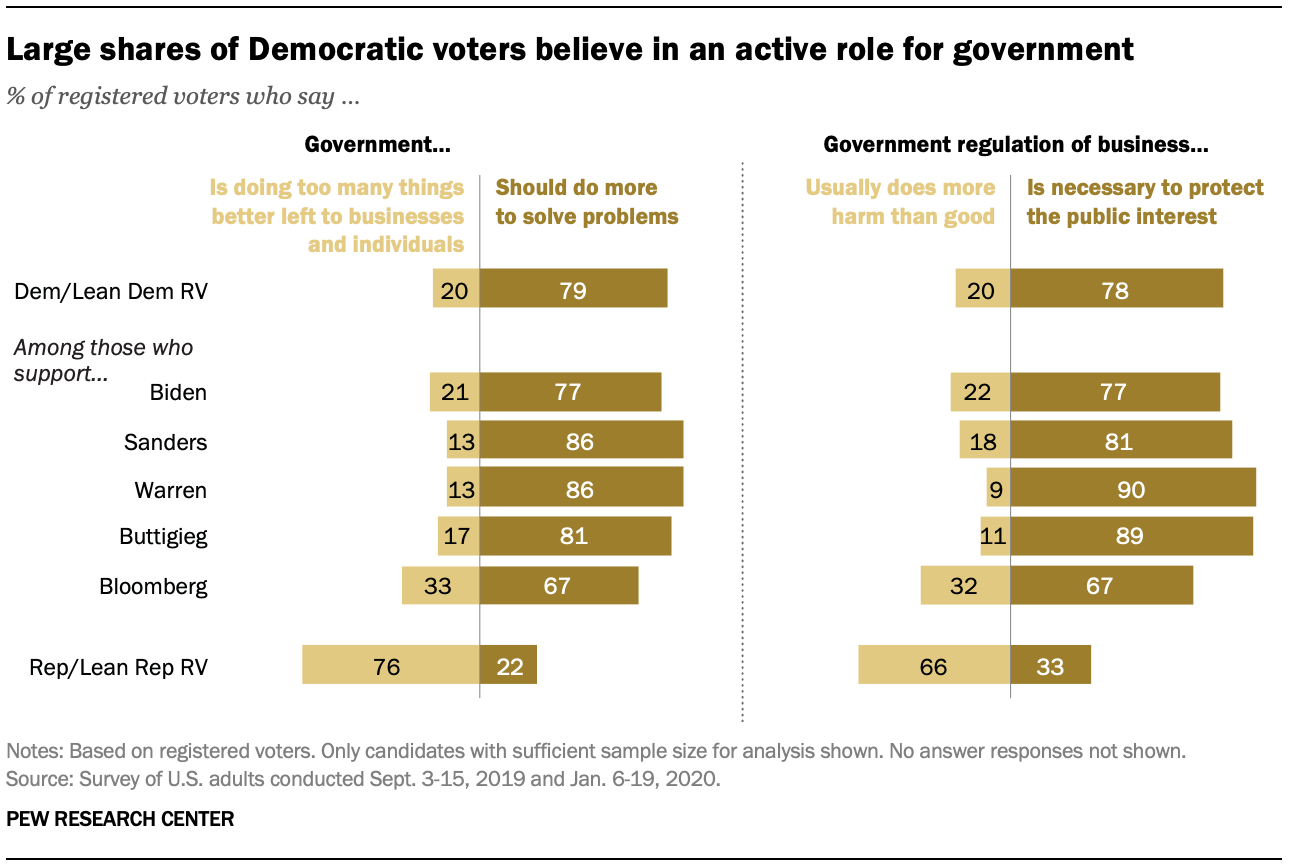
These views are held by large majorities of the supporters of most top Democratic presidential candidates. The shares of Bloomberg supporters who believe in an active role for government and the need for regulation are modestly smaller than among other candidates’ supporters. For instance, 67% of Bloomberg supporters say government should do more to solve problems, compared with 77% of Biden supporters and 86% of both Warren and Sanders supporters who say this.
Views among the supporters of all top Democratic candidates stand in stark contrast to views among Republicans: 76% of Republican and Republican-leaning voters say the government is doing too many things better left to businesses and individuals and 66% say government regulation of business usually does more harm than good.
Supporters of Democratic candidates differ in support for providing more aid to the needy
A majority of Democratic voters (61%) say the government should provide more assistance to people in need. Three-in-ten say the government is providing about the right amount of assistance to people in need, while just 9% say it should provide less assistance.
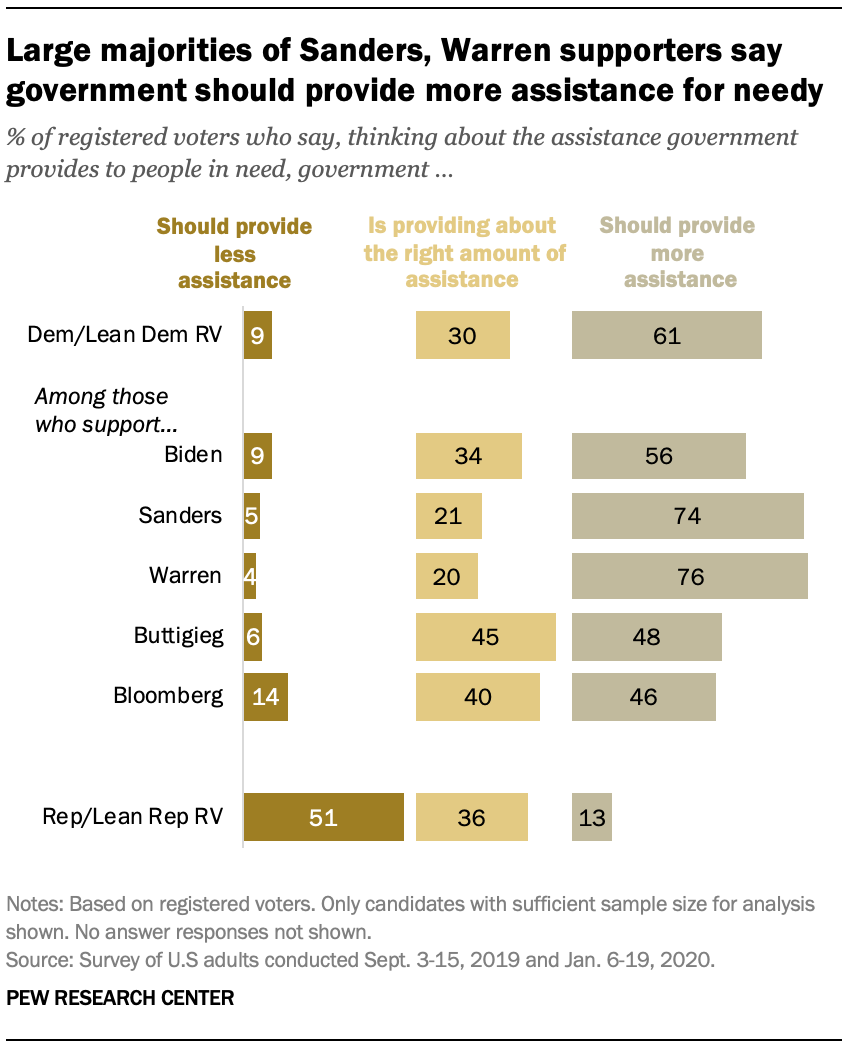
Warren and Sanders supporters stand out for their strong support for greater assistance to people in need. About three-quarters of Democratic voters who name Warren (76%) or Sanders (74%) as their first choice believe the government should provide more assistance to people in need. By contrast, smaller shares of Biden (56%), Buttigieg (48%) and Bloomberg (46%) supporters take this view. Backers of these three candidates are more likely than Warren and Sanders supporters to say the government is providing about the right amount of assistance to people in need. Few supporters of any Democratic candidate think government assistance to people in need should be cut.
As with many questions about the role of government, the gap between the views of Republican voters and Democratic voters is quite large. Half of Republican and Republican-leaning voters think government should provide less assistance to people in need, while 36% say it’s providing the right amount and only 13% say it should provide more.
On balance, more Democratic voters say that hard work is no guarantee of success for most people (55%) than say that most people who want to get ahead can make it if they’re willing to work hard (45%).
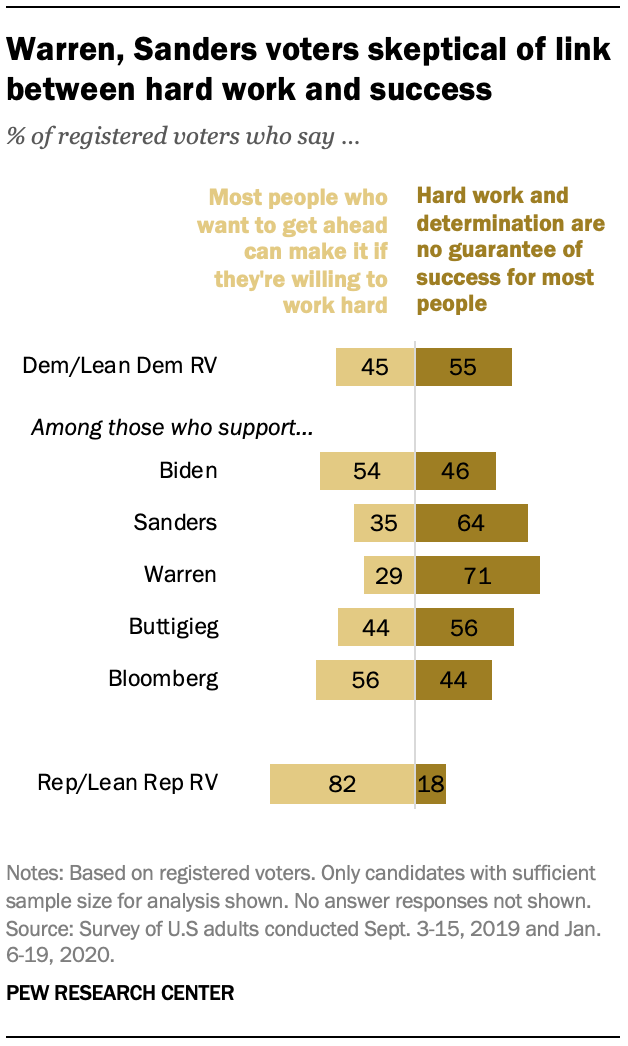
This question highlights significant differences in views between the supporters of top Democratic candidates
A narrow majority of Biden supporters (54%) say most people can make it if they’re willing to work hard (46% say hard work is no guarantee of success for most people). Views among Bloomberg supporters are similar to those of Biden supporters.
Sanders and Warren backers are decidedly of the view that hard work is no guarantee of success for most people. About seven-in-ten Warren supporters (71%) say this, as do 64% of those who support Sanders.
Republicans overwhelmingly say hard work itself leads to success: 82% of Republican and Republican-leaning voters say that most people who want to get ahead can make it if they’re willing to work hard; just 18% say hard work and determination are no guarantee of success for most people.
Views of college tuition and health insurance coverage
Democratic voters back the idea of making tuition at public colleges and universities free (81% are in favor), but there are differences in the degree of support by candidate preference.
Fully 92% of Sanders voters say they favor making tuition free, including 67% who say they strongly favor the policy. A large share of Warren voters also support free tuition at public colleges and universities (88%); Warren supporters are somewhat less likely than Sanders’ to back this policy strongly (54% vs. 67%).
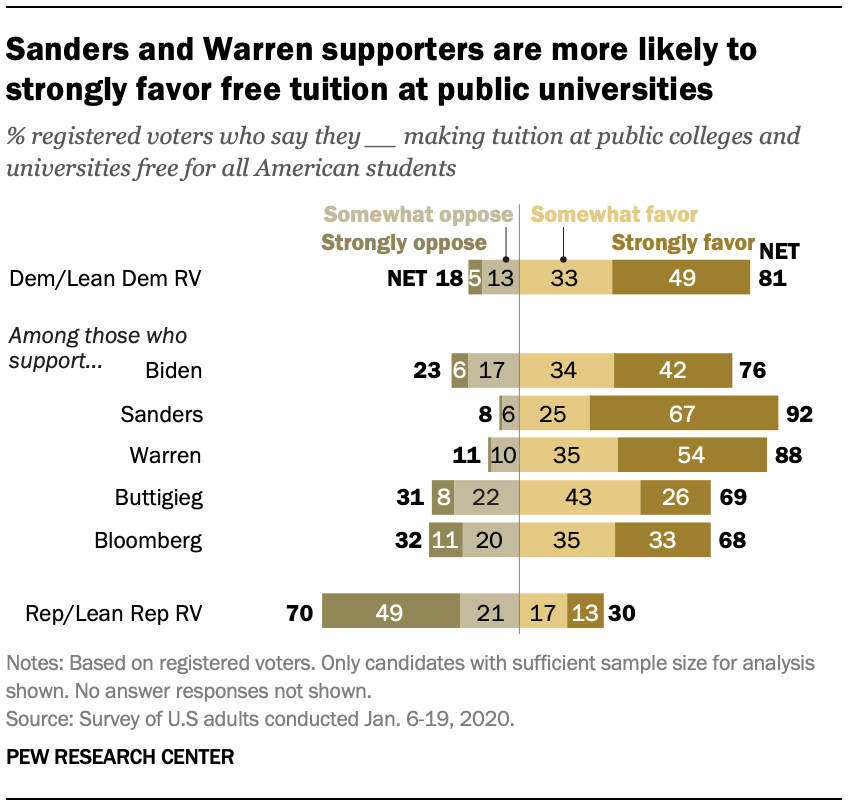
Sizable but smaller majorities of Biden (76%), Buttigieg (69%) and Bloomberg (68%) supporters favor making tuition at public colleges and universities free for all Americans. Strong support is below 50% for all three groups of supporters.
About three-in-ten Bloomberg (32%) and Buttigieg (31%) supporters oppose free college tuition, as do 23% of Biden supporters. However, these shares pale in comparison to the share of Republican voters who oppose the policy (70%).
When it comes to health insurance policy, most Democratic voters say they would support a single-payer approach where a government health insurance program would replace private insurance. Support among Democrats is even higher for the government providing a public option that people could choose instead of private insurance plans.
Overall, 86% of Democratic voters support the government offering a health insurance plan, similar to Medicare, that Americans could choose to purchase instead of private insurance. A smaller but sizable majority of Democratic voters also say they support a single national health insurance program that would replace private insurance (74%).
Among Sanders voters, about equal shares say they favor the single-payer approach (87%) as the public option approach (86%). While overall levels of support are similar, Sanders supporters express more intense support for a single-payer program that would replace private health insurance plans: 60% say they favor this policy strongly, compared with 42% who strongly favor the government providing a public option, in addition to private plans.
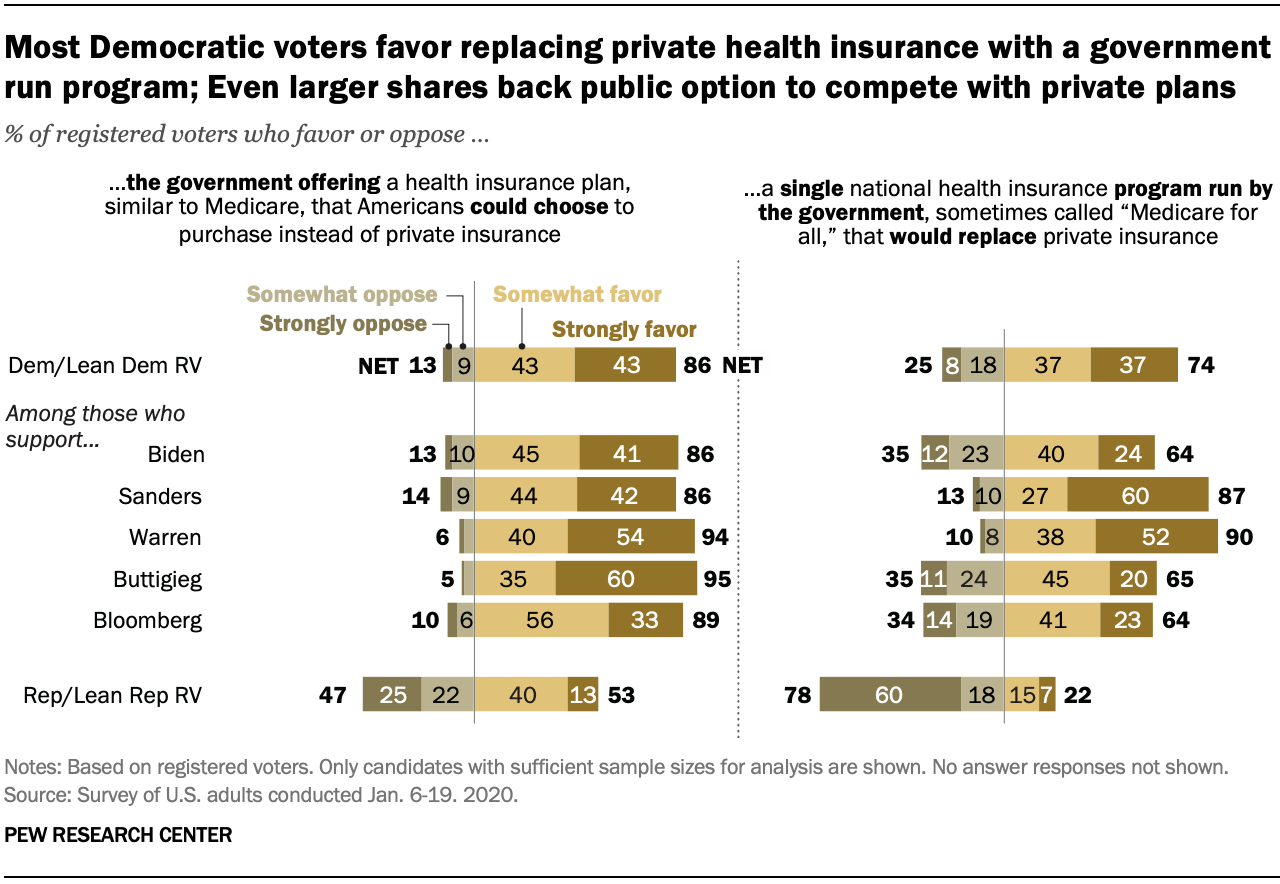
Large shares of Warren voters express support for each of these two health care policy options: 94% favor the government offering a public option and 90% favor replacing private insurance with a government-run program. There is little difference in the intensity of support for these two policies among Warren voters.
Supporters of Biden, Buttigieg and Bloomberg are more likely to say they would support a government-run public option than a government-run program that would replace private insurance. For instance, 86% of Biden supporters favor the government offering a health insurance plan, similar to Medicare, that American could choose to purchase, compared with 64% who favor replacing private health insurance with a government-run program.
Republican voters are far less favorable toward both policies than Democrats. Overall, about half of Republican voters (53%) say they would favor a public option, while 47% say they would oppose this. Republicans broadly reject a “Medicare for all” approach that would replace private insurance completely; 78% oppose this plan, including 60% who strongly oppose it.
Democratic voters overwhelmingly view economic inequality as problem, diverge in views of impact of billionaires
Nearly all Democratic voters (95%) say economic inequality is at least a moderately big problem for the country today, including 68% who say it is a very big problem. Among all Democrats and Democratic leaners, economic inequality only ranks behind issues like the affordability of health care and climate change at the top of their list of national concerns.
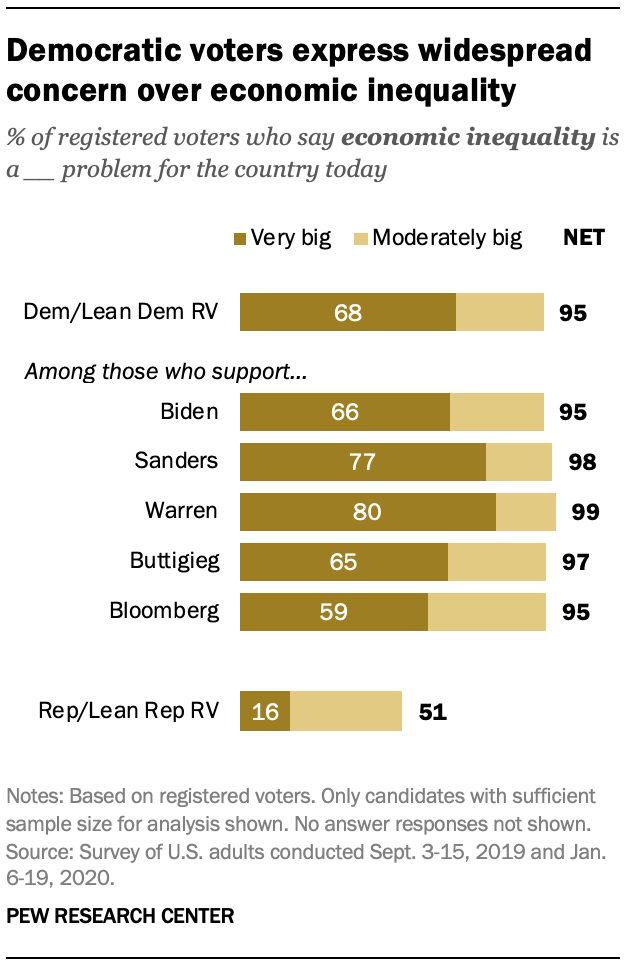
Warren (80%) and Sanders (77%) supporters are especially likely to call economic inequality a very big problem compared with backers of other leading Democrats. Nonetheless, among all groups of Democratic supporters, more than nine-in-ten say economic inequality is at least a moderately big problem, including more than half who call it a very big problem.
This issue has one of the largest divides in terms of the priority placed on it by Republicans and Democrats: Half of Republican voters say economic inequality is at least a moderately big problem (only 16% say it is a very big problem). Overall, 49% of Republican voters say economic inequality is only a small problem, or not a problem at all.
While most supporters of leading Democratic candidates view economic inequality as a big national problem, there is disagreement over the impact of billionaires on the country.
A narrow majority of all Democratic and Democratic-leaning voters (56%) say the fact that there are some people in the country who have personal fortunes of a billion dollars or more is neither a good thing nor a bad thing for the country. A third call this a bad thing, while just 10% say it is a good thing.
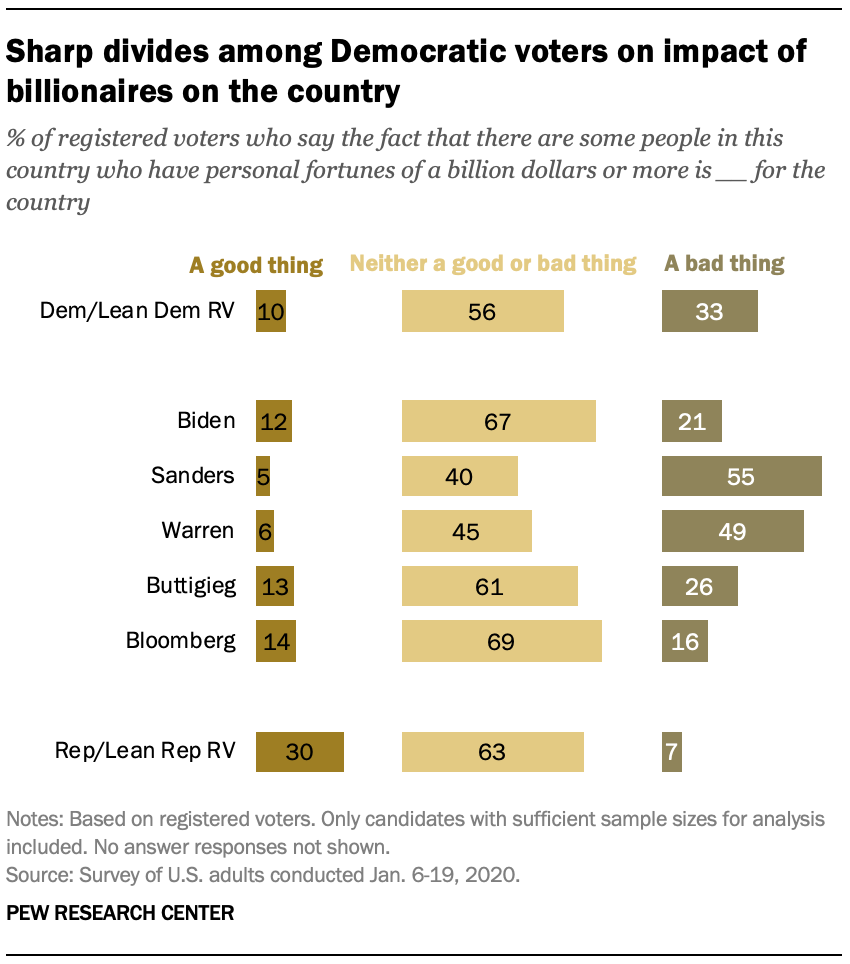
By 55% to 40%, more Sanders supporters view billionaires as a bad thing for the country than say it is neither good or bad. Warren supporters are roughly split between saying billionaires are a bad thing for the country (49%) and saying that they are neither good nor bad (45%).
Supporters of other Democratic candidates take a less negative view of the fact that there are people in the country with personal fortunes of a billion dollars or more. For instance, 69% of Bloomberg supporters and 67% of Biden supporters say this is neither a good or bad for the country.
A majority of Republican voters (63%) say it’s neither good nor bad that there are billionaires in the U.S. Just 7% say billionaires are a bad thing for the country; a greater share (30%) says they are a good thing.
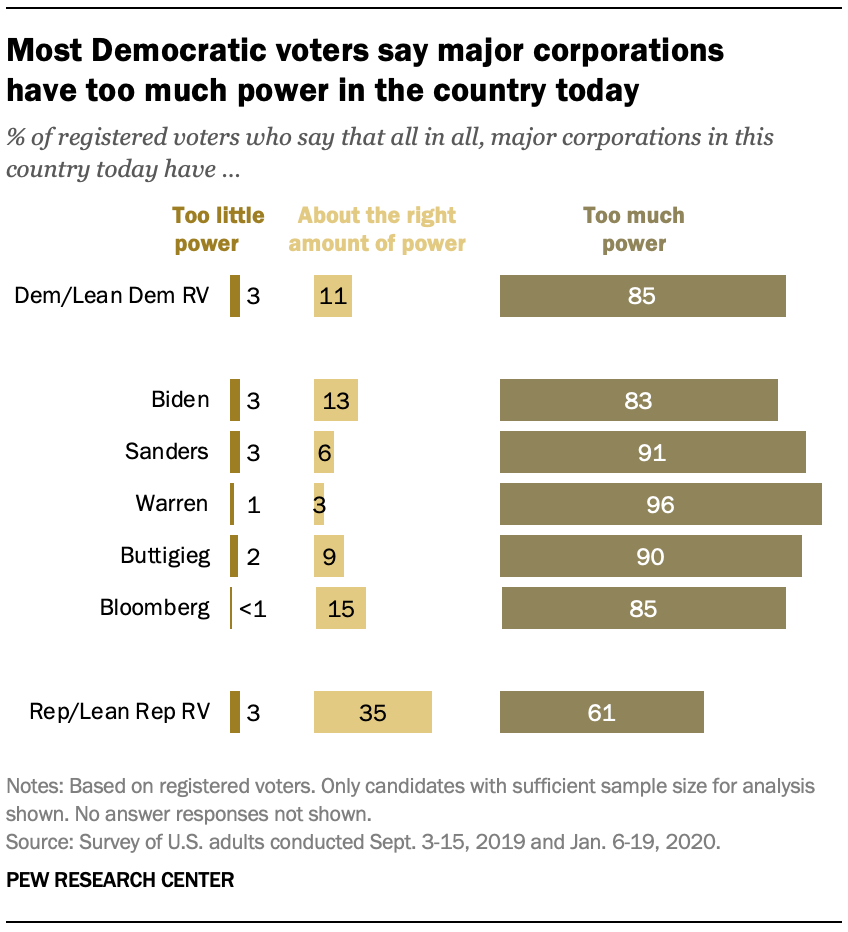
Democratic voters express concerns about the power and influence of major corporations in the country today, regardless of primary candidate preference. Large majorities of Democratic and Democratic-leaning voters say major corporations in this country have too much power (85%). Much smaller shares say they have about the right amount of power (11%) or too little power (3%).
There is some bipartisan agreement on this issue: 61% of Republican and Republican-leaning voters say major corporations have too much power, though the share of Republicans who say they have about the right amount of power (35%) is still higher than the share of any Democratic candidate’s supporters who say this.
Most Democratic voters say gun laws in this country should be stricter
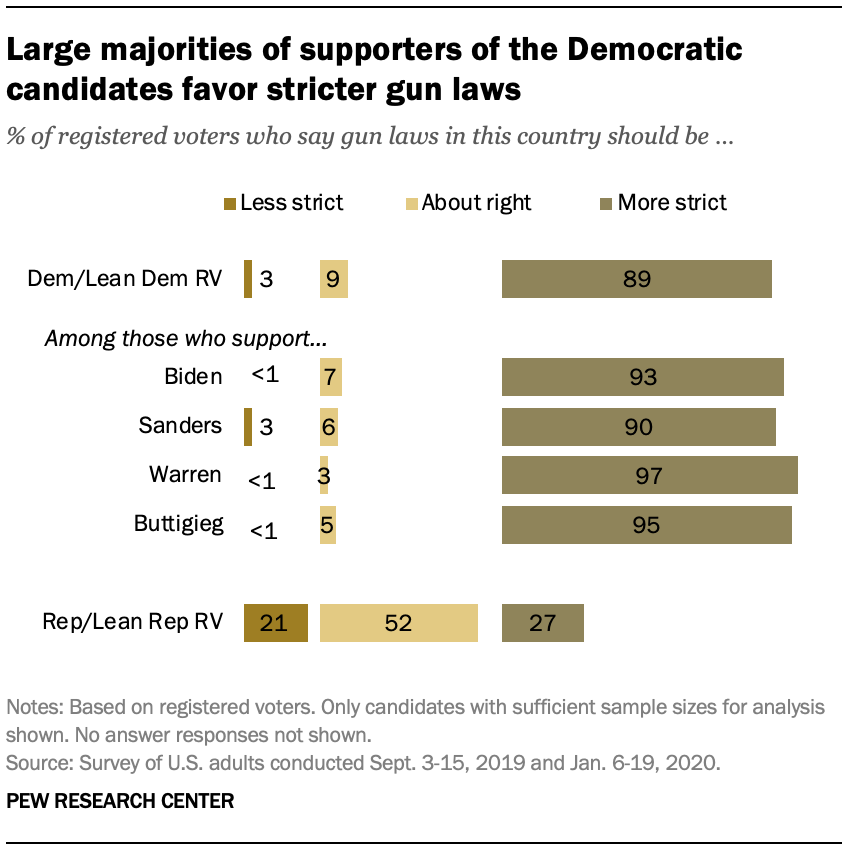
An overwhelming share of Democratic voters say that gun laws in this country should be more strict than they are today (89%). Almost no Democrats say they should be less strict (2%); just 9% say they’re about right.
Large majorities of Warren (97%), Buttigieg (95%), Biden (93%) and Sanders (90%) supporters think gun laws in the country should be more strict. By contrast, 52% of Republican and Republican-leaning voters say that gun laws in this country are about right, while 27% say they should be more strict and 21% say they should be less strict.
Modest differences in how candidates’ backers view race, immigration
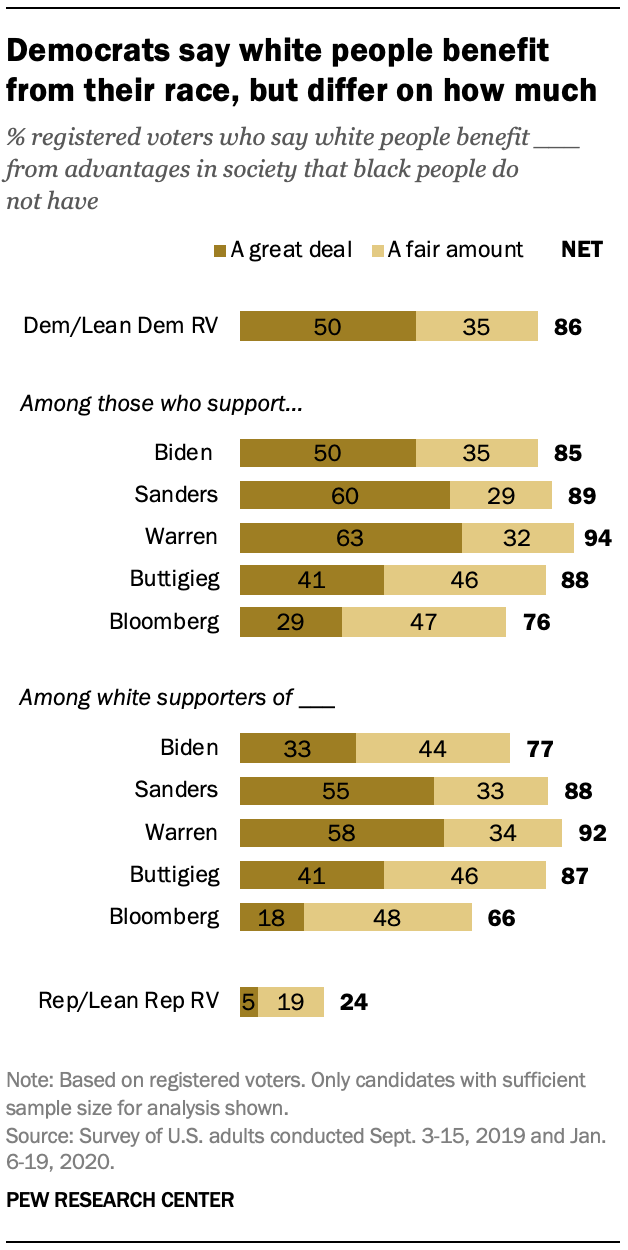
Large majorities of Democrats – regardless of which primary candidate they support – say white people benefit at least a fair amount from advantages in society that black people do not have, but there are differences in the degree to which this view is held.
For instance, about six-in-ten Warren (63%) and Sanders (60%) backers say white people benefit “a great deal” from societal advantages black people do not have, compared with half of Biden supporters (50%), 41% of Buttigieg supporters and just 29% of Bloomberg backers.
To some extent, these differences reflect the racial composition of each candidate’s supporters, since black Democrats are more likely than white Democrats to say white people benefit a great deal from societal advantages that black people do not have. But differences on this question across candidates’ supporters remain evident when controlling for race: White Sanders and Warren supporters are more likely than those who back Biden or Buttigieg – and much more likely than those who back Bloomberg – to say that whites benefit a great deal from advantages in society that black people do not have.
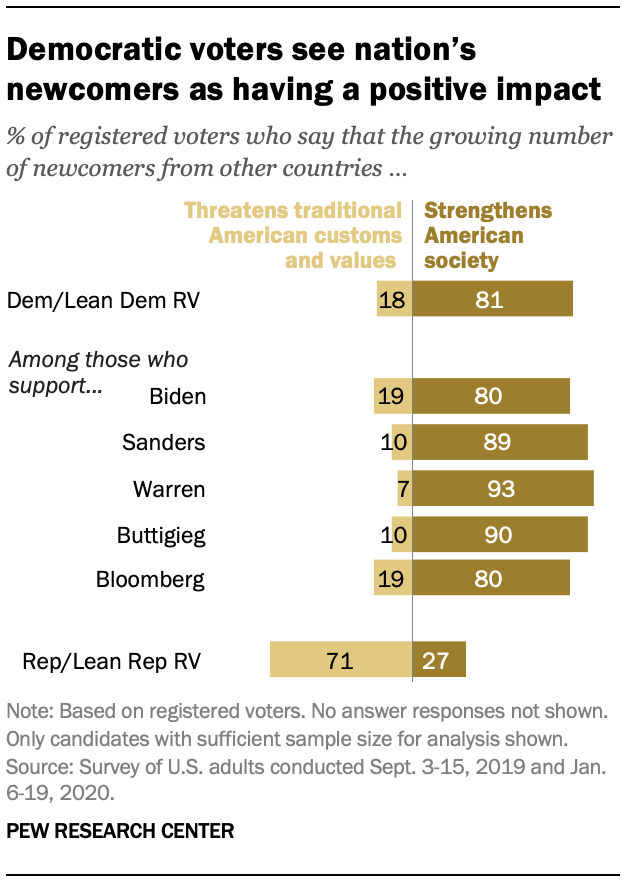
A broad majority of Democratic voters take a positive view of the impact of people from other countries on the U.S. Overall, 81% of Democratic and Democratic-leaning registered voters say the growing number of newcomers from other countries strengthens American society; just 18% say newcomers threaten traditional American customs and values.
These views vary little across the different candidates’ supporters. Backers of Biden and Bloomberg are slightly less likely than other Democratic voters to take the view that newcomers strengthen American society; still, eight-in-ten of their supporters say this.
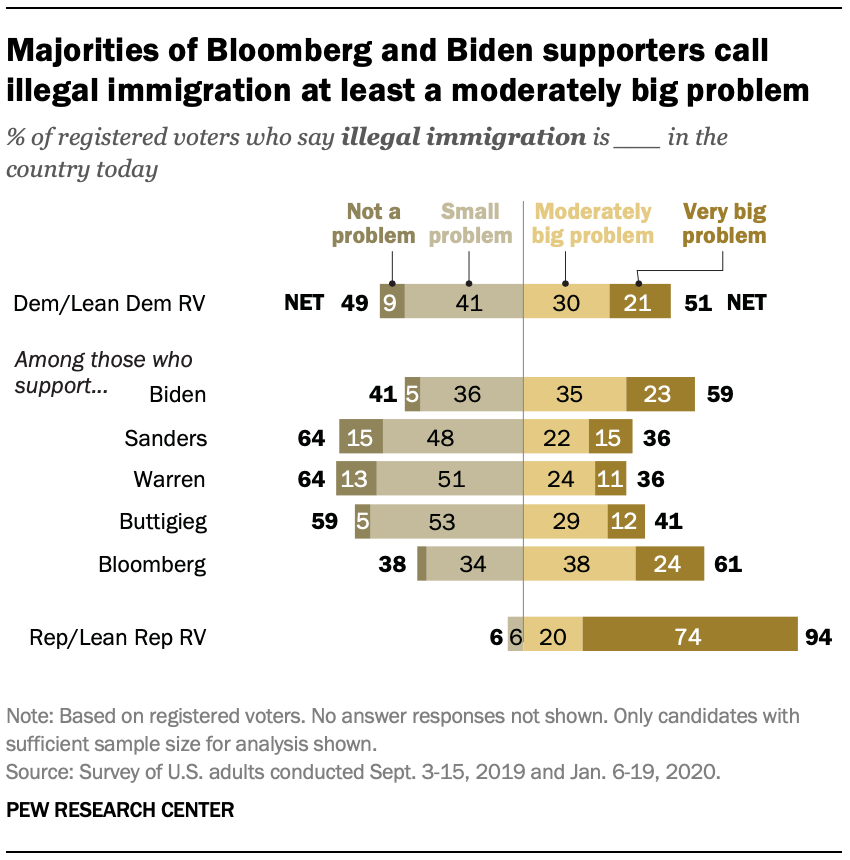
The views of Republican registered voters stand in stark contrast: 71% say the growing number of newcomers from other countries threatens traditional American customs and values.
Democratic voters do not view illegal immigration as among the top problems facing the country: 51% say it is a moderately big or very big problem; about as many (49%) say it is a small problem or not a problem. Democrats are much more likely to call issues like health care affordability and climate change big problems. By contrast, illegal immigration ranks at the top of Republican voters’ concern list: 94% say it’s at least a moderately big problem, including 74% who call it a very big problem.
Majorities of Democrats who support Bloomberg (61%) and Biden (59%) call illegal immigration at least a moderately big problem in the country. Supporters of other Democratic candidates place less emphasis on the issue. For instance, just 36% of both Sanders and Warren supporters say illegal immigration is a moderately big or very big problem for the country.
Near unity among Democratic voters in views of climate change
Concern over the issue of climate change is a view that unites supporters of top 2020 Democratic primary candidates. At least nine-in-ten of those who support leading Democratic candidates say climate change is a moderately big or very big problem for the country; three-quarters or more call it a very big problem. To the extent that differences exist across Democratic supporters, the differences are a matter of degree: 75% of Biden and Bloomberg supporters say climate change is a very big problem, compared with slightly larger majorities among supporters of other Democratic candidates.
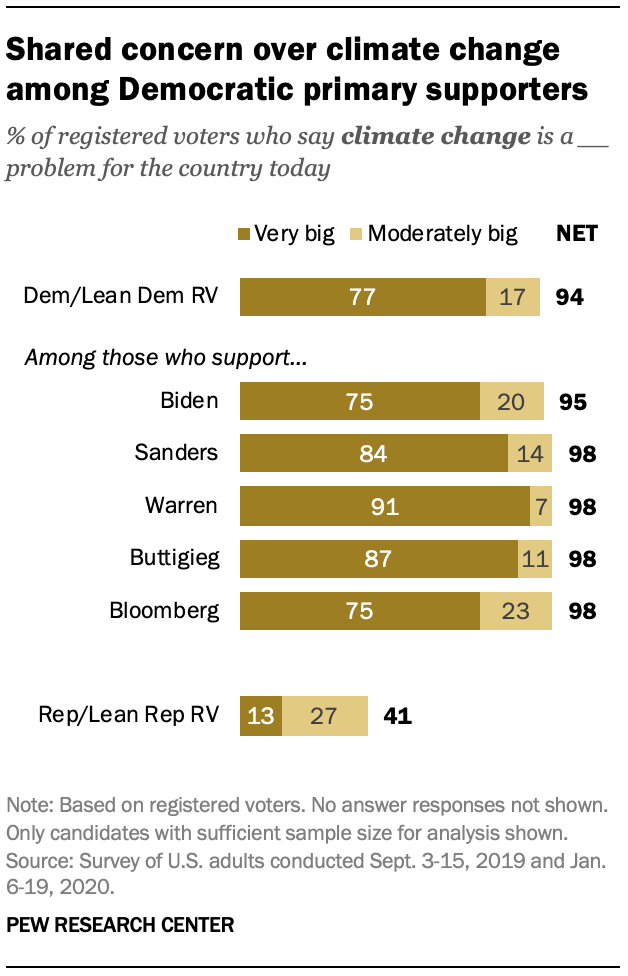
The issue of climate change – like the issue of illegal immigration – highlights the wide gulf in partisan priorities. Just 41% of Republican voters say climate change is at least a moderately big problem for the country, including just 13% who say it is a very big problem.
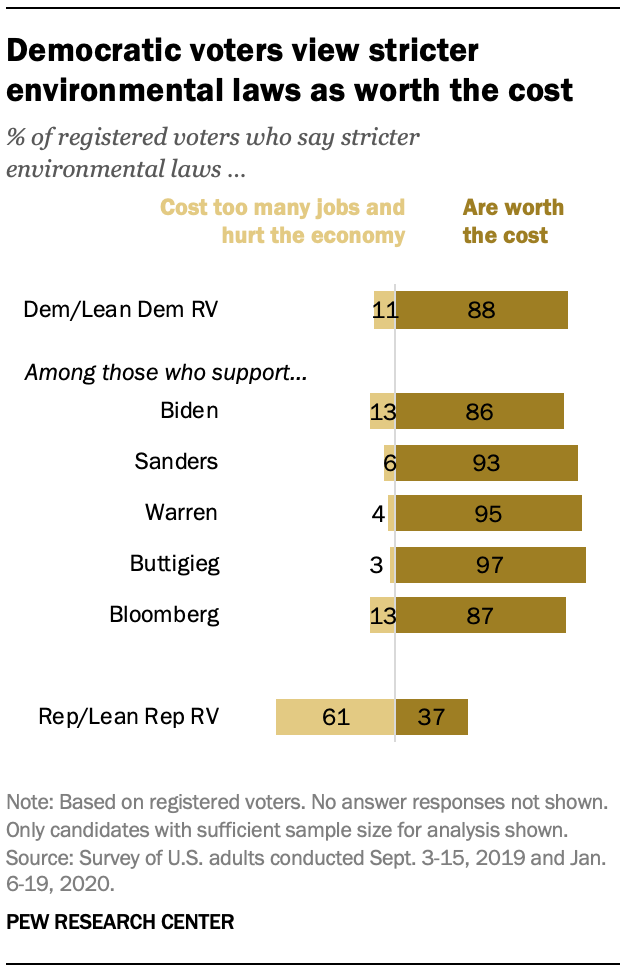
Views on environmental laws also underscore the alignment of Democrats, in general terms, on the issues of climate change and the environment. Overall, 88% of Democratic and Democratic-leaning registered voters say stricter environmental laws are worth the cost, compared with just 11% who say they cost too many jobs and hurt the economy. Views among Democrats differ little on this question by primary candidate preference. By contrast, a majority (61%) of Republican registered voters say stricter environmental laws cost too many jobs and hurt the economy.
Views on gender, same-sex marriage and religion
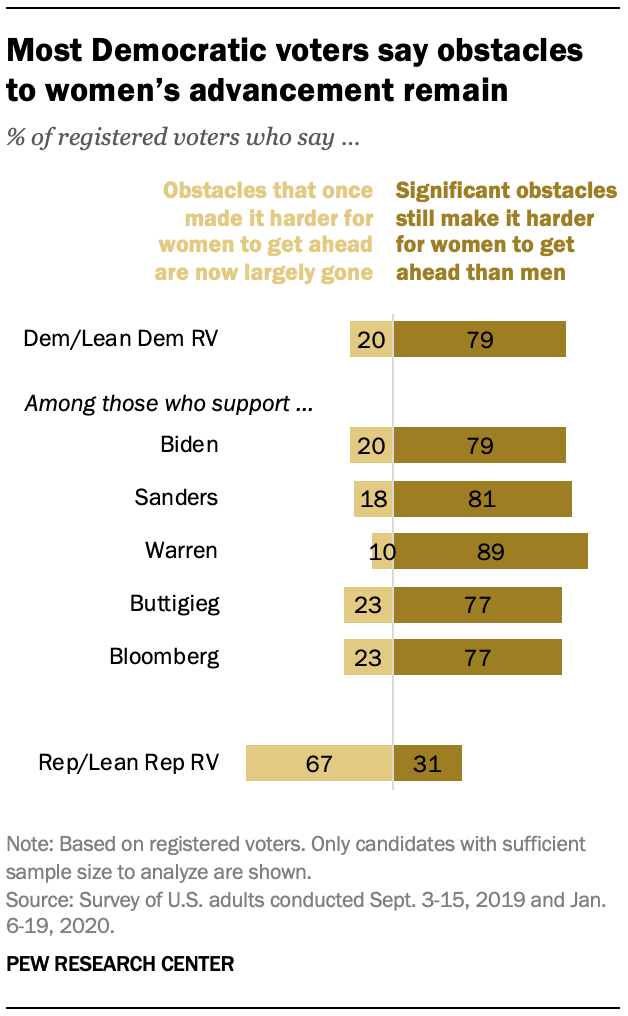
Large majorities of Democratic and Democratic-leaning registered voters hold the view that “significant obstacles still make it harder for women to get ahead than men,” regardless of which primary candidate they support. For instance, 79% of Biden supporters and 81% of Sanders supporters believe significant obstacles continue to stand in the way of women’s advancement. But Warren supporters (89%) are especially likely to take this view.
Views on the obstacles men and women face in the country today remain a dividing line between Republicans and Democrats.
On the issue of same-sex marriage, most Democratic and Democratic-leaning voters (82%) say the legalization of same-sex marriage in the U.S. has been either a somewhat or very good thing for our society. While majorities of supporters of all Democratic primary candidates are more likely to say legalization of same-sex marriage has been good than bad for society, the intensity and universality of support for this change varies by primary candidate preference.
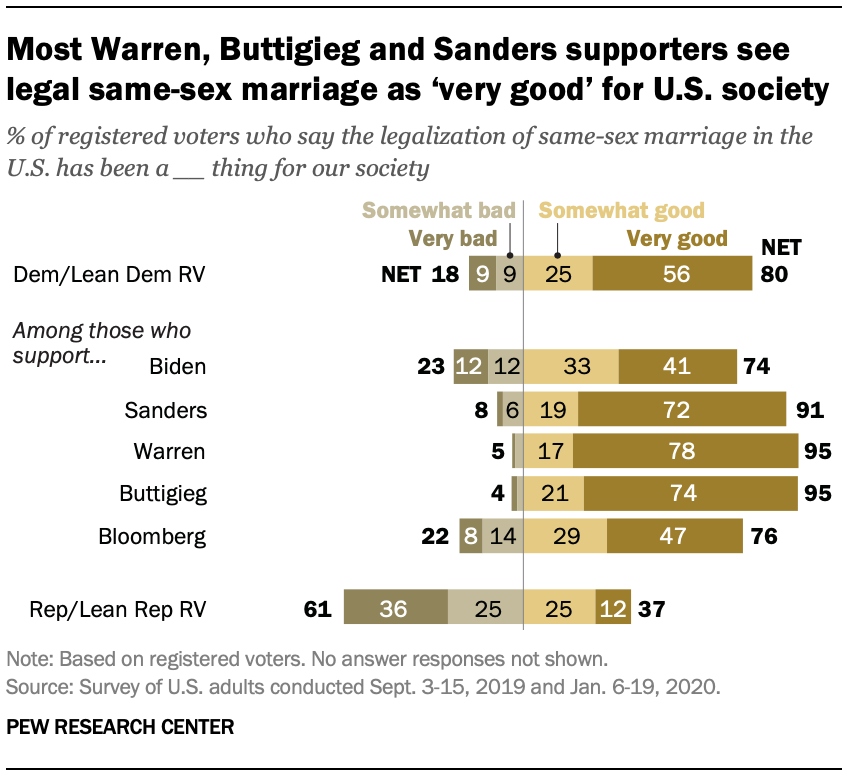
About three-quarters of Bloomberg (76%) supporters say the legalization of same-sex marriage has been a good thing for society, including 47% who say it has been a very good thing. Views among Biden supporters are similar.
By contrast, positive views of this societal change are more strongly and widely held among Democrats who support Warren, Buttigieg or Sanders: At least nine-in-ten say the legalization of same-sex marriage has been a good thing, including at least seven-in-ten who say it’s been a very good thing.
As with views on obstacles to women’s advancement, Republicans and Democrats are far apart in their views on the impact of legalizing same-sex marriage. Most Republican and Republican-leaning voters (61%) say legalizing same-sex marriage has been bad for U.S. society, including 36% who say the impact has been very bad.
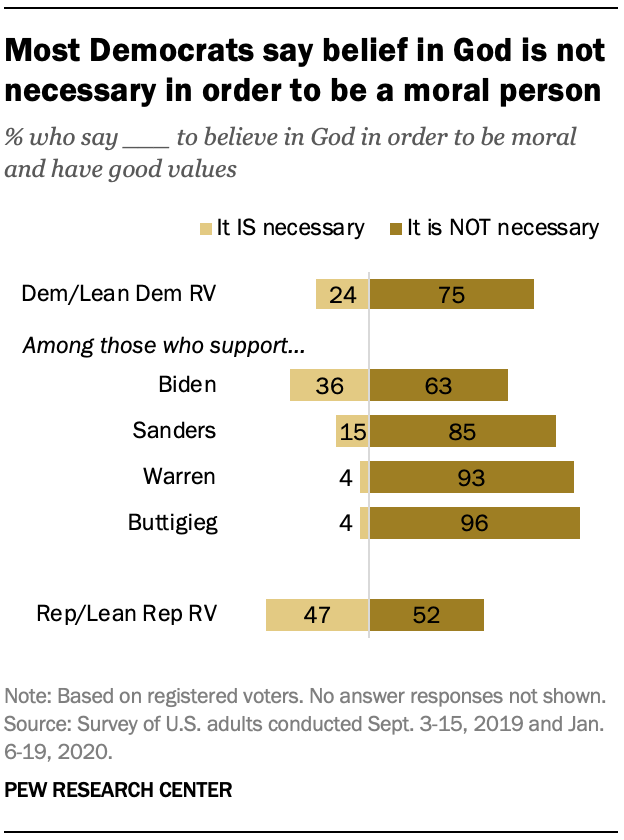
Most Democrats – regardless of candidate preference – say that is it not necessary to believe in God in order to be moral and have good values.
This view is less widely held among Biden supporters (63%) than among backers of Buttigieg (96%), Warren (93%) and Sanders (85%). To some extent, this reflects Biden’s greater level of support among black Democrats, who are more likely than white Democrats to say belief in God is necessary for morality; however, a gap is still seen between white backers of Biden (81% of whom say it is not necessary to believe in God to be moral and have good values) and white backers of Sanders, Warren and Buttigieg (95% or more of whom say belief in God is not necessary to believe in God to be a moral person).
Republicans are divided on this question: 52% of Republican and Republican-leaning registered voters say it’s not necessary to believe in God to be a moral person; about as many (47%) say this is necessary.
Democrats are united in support of cooperation with U.S. allies, differ on importance of U.S. military superiority
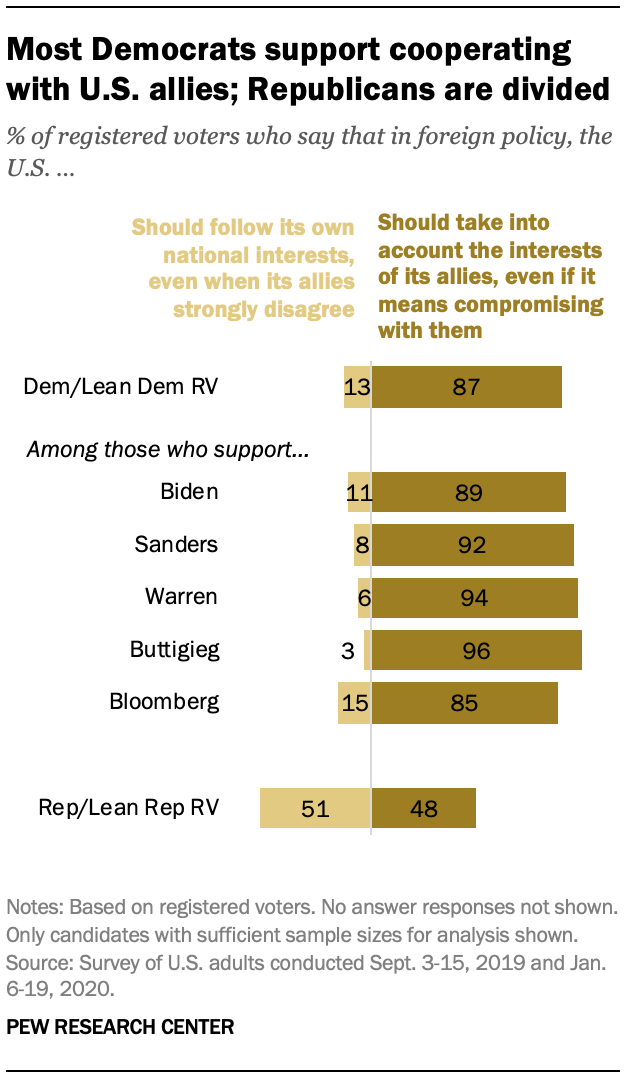
Democratic registered voters overwhelmingly agree that the United States should address the interests of its allies when conducting foreign policy. This view varies little among supporters of Democratic presidential candidates.
Fully 87% of Democratic voters say the U.S. should take into the account the interests of its allies when making foreign policy decisions, even if it means making compromises with them. Few (13%) say the U.S. should follow its own national interests, even when its allies strongly disagree.
Republican and Republican-leaning voters are divided over whether the United States should follow its own national interests, even when allies disagree (51%) or address the interests of allies, even if this means compromises (48%).
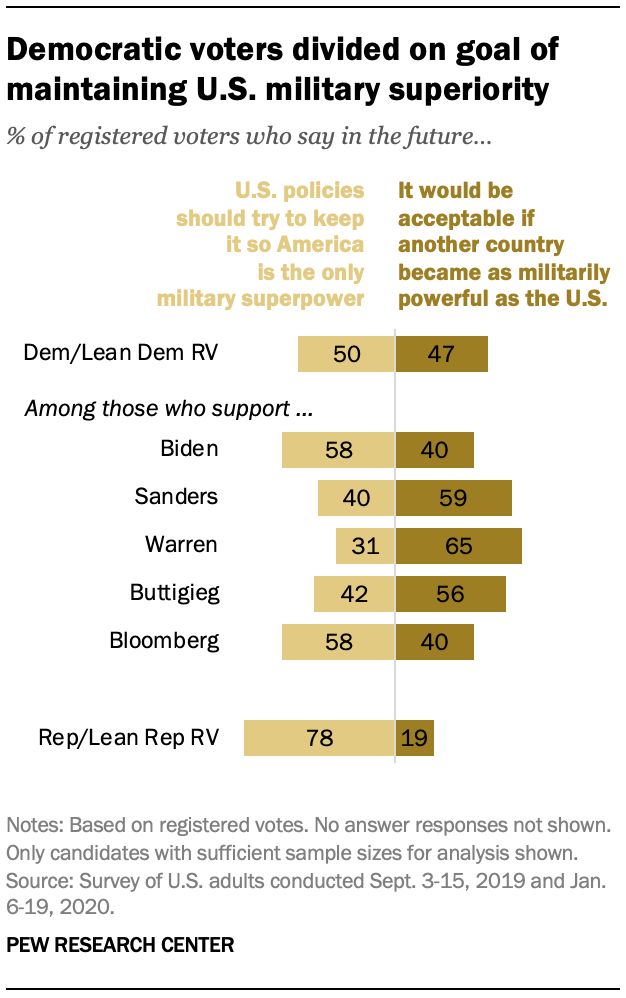
There is far less agreement among Democrats in views of whether U.S. policy should work to maintain its global military superiority. Among Democratic voters who name Warren as their first choice for the nomination, 65% say that in the future it would be acceptable if another country became as militarily powerful as the U.S.; just 31% say U.S. policies should try to maintain its position as the world’s only military superpower.
Majorities of those who support Sanders (59%) and Buttigieg (56%) also say it would be acceptable if another country became as militarily powerful as the U.S.
By contrast, identical shares of Biden and Bloomberg supporters (58% each) say U.S. policies should try to ensure that this country remains the only military superpower.
Republican voters, by a margin of about 4-to-1 (78% to 19%), say U.S. policies should try to keep it that America is the only military superpower.
Supporters of Democratic candidates are deeply divided on U.S. global standing
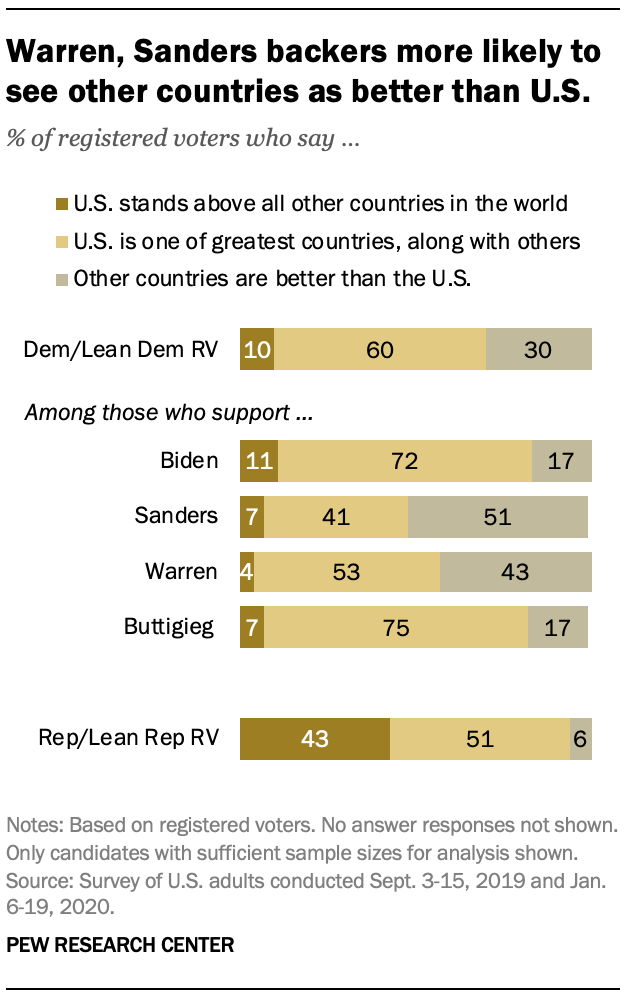
Democratic voters differ substantially in opinions about how the United States compares with other countries around the world.
Warren and Sanders supporters are more than twice as likely as those who support Biden and Buttigieg to say that there are other countries that are better than the U.S.
Among Sanders supporters, 51% say there are other countries that are better than the U.S., compared with 41% who say the U.S. is one of the greatest countries along with some others; 7% say the U.S. “stands above” every other country. About four-in-ten Warren supporters (43%) say there are other countries that are better than the U.S., while 53% say the U.S. is among the world’s greatest countries, and 4% say the U.S. stands above all others.
By contrast, majorities of Biden (72%) and Buttigieg (75%) supporters say the U.S. is one of the world’s greatest countries; just 17% of each group of supporters say there are other countries that are better than the U.S.
Positive views of free trade agreements cross party lines
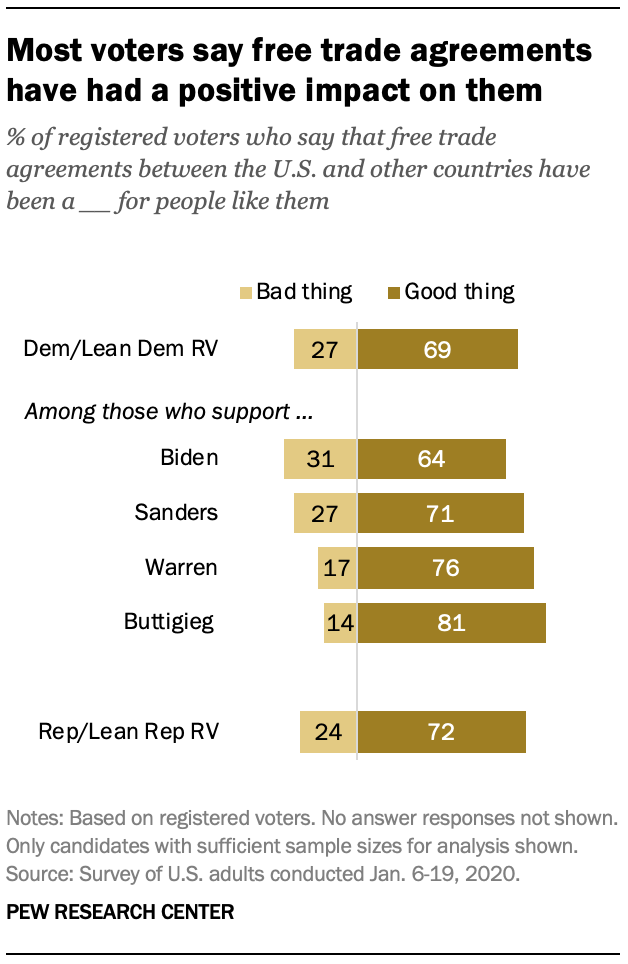
For the most part, Democratic voters express positive views of the personal impact of free trade agreements. Majorities of the supporters of Biden, Sanders, Warren and Buttigieg say free trade agreements have been a good thing for “people like them.”
Still, roughly three-in-ten Biden (31%) and Sanders supporters (27%) say free trade agreements have been bad for them. That’s higher than the shares of Warren (17%) and Buttigieg supporters (14%) who say this.
Notably, attitudes toward free trade agreements do not differ across partisan lines. Overall, similar shares of Democratic and Republican voters say their impact has been positive (69% and 72%, respectively).




